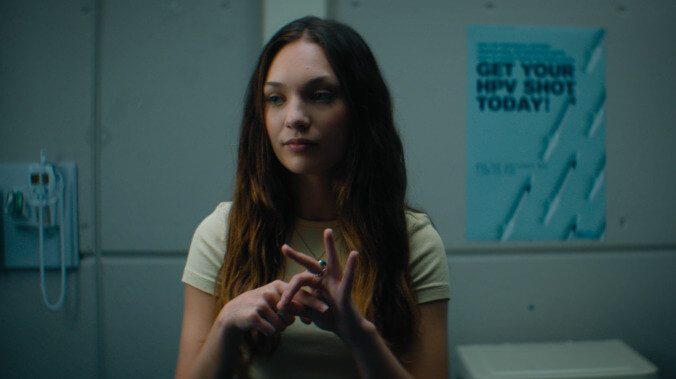Fitting In review: Maddie Ziegler charms in a journey of unconventional sexual discovery
Writer-director Molly McGlynn tells a semi-autobiographical comedy about life without a vaginal canal

Adolescence is a tough time for just about everyone, and finding out that you’re different from your peers can only make that time worse. This is half of the wordplay inherent in the title of writer-director Molly McGlynn’s semi-autobiographical film Fitting In, wherein she examines a very personal struggle she had in being diagnosed with a rare reproductive condition in her teenage years. Though not without its rough edges, McGlynn’s film is emotionally raw and willing to engage with the complexities and nuances of her situation, providing a fascinating look at the intersectionality of burgeoning womanhood, intersex identity, and messy sexuality that doesn’t adhere to rigid or widely acknowledged labels.
McGlynn fictionalizes her experiences through self-insert Lindy (Maddie Ziegler), a 16-year-old track runner living with her single mom Rita (Emily Hampshire). Having never had her period but still wanting to pursue sexual activity with her boyfriend Adam (D’Pharaoh Woon-A-Tai), Rita goes to her gynecologist to receive birth control, only to discover that she does not have much of a vaginal canal to speak of. She is diagnosed with MRKH syndrome, a rare condition wherein she was born without a uterus or full vagina, leaving her unable to have periods, get pregnant, or even have comfortable penetrative sex without dilation or so-called corrective surgery.
This realization puts Lindy on an emotional roller coaster that isolates her from Adam and her best friend Viv (Djouliet Amara), as she lashes out when she doesn’t feel she can share this difference with them or anyone else. After all, how can she, when doesn’t even understand what her diagnosis means for her going forward? Is she any less of a woman for not having a uterus? Does she want to embrace an intersex or non-binary identity like her effortlessly confident acquaintance Jax (Ki Griffin)? Can she just force a “normal” sex life into existence through sheer stubbornness, skipping up whole sizes of dilators just to carve out a dick-sized hole in herself? Or is she doomed to perpetual virginity, whatever “virginity” even means? These are messy, complicated issues of individual identity and self-acceptance that McGlynn carefully avoids making universal in their application through a cast of characters with varying experiences in their adolescent sexualities. Instead, she focuses on how Lindy has to come to terms with her unique situation and find a way forward that works for her.








































